Tags
Africa, Archbishop of Canterbury, Asia Minor, astrology, astronomy, atonement, Basel, calendars, Caucasus, celestial motion, Christian, Cur Deus Homo, cycles, De imagine mundi, Easter, Egypt, Egyptians, equinox, Europe, geography, God, Gothic type, Greeks, Hebrews, India, islands, Johann Amerbach, Jupiter, lunar, marginalia, Mesopotamia, Monologion, moon, Nuremberg, oceans, Palestine, Parthia, Proslogion, Roman type, Romans, Saint Anselm, seas, solar, solstice, St Augustine, sun, Syria, theology, Thomas More, tides, time, University of Utah, vellum, water, zodiac
“…let my mind meditate upon it; let my tongue speak of it. Let my heart love it; let my mouth talk of it. Let my soul hunger for it; let my flesh thirst for it; let my whole being desire it…”
OPERA
Saint Anselm, Archbishop of Canterbury (ca. 1033-1109)
Basel: Johann Amerbach, not after 1497
Second, enlarged edition
The first edition of the collected works of St Anselm was printed in Nuremberg in 1491. After St Augustine and Thomas More, St Anselm was one of the most widely read of Christian theological writers in western Europe. His influence was far-reaching. This collection includes his three most famous works: the Cur Deus Homo, a treatise on the atonement; the Proslogion, which contains his argument for the existence of God; and the Monologion. The last thirty pages of this volume is a two-part geographical astronomical/astrological compendium, “De imagine mundi,” dating from about 1100, containing chapters on India, Parthia, Mesopotamia, Syria, Palestine, Egypt, the Caucasus, Asia Minor, Europe, Africa and sections on islands and water (seas, oceans, tides). There are a few articles on the zodiac, and more on astronomy. Anselm describes celestial motions of the sun, moon and Jupiter, with reference to the solar and lunar cycles and the importance of their measurement for calculating time. Anselm notes different divisions of time as reckoned by the ancient Hebrews, Egyptians, Greeks, and Romans. He addresses various calendars and the cycles and divisions on which they were based. He notes the practical importance of their use for calculating astronomical events such as the equinox and solstice, and the sacred importance of calculating Easter. Printer Johann Amerbach (ca. 1440-1513) was the first printer of Basel to use a Roman type as well as Gothic. Printed in two columns of fifty lines each in Gothic type. University of Utah copy bound in 18th century vellum over boards; brown stain on cover. An early ownership inscription is inked out, and a stamp erased from the title-page. Some contemporary marginalia.

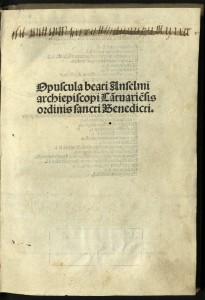
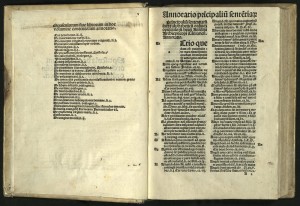
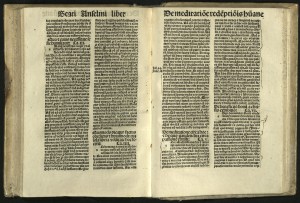
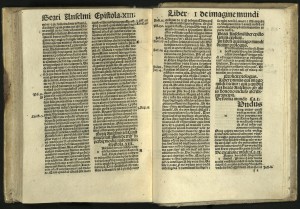
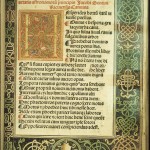
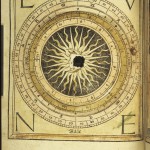
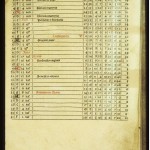

You must be logged in to post a comment.